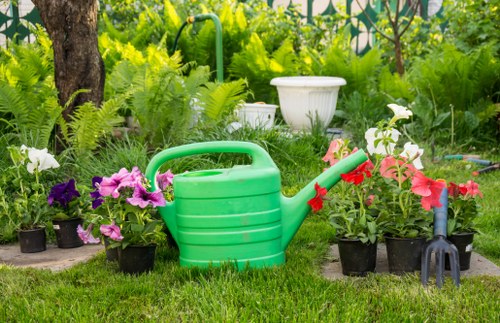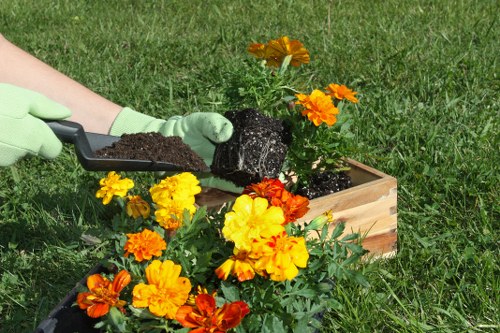Garden Maintenance in Sudbury: Keeping Your Green Space Flourishing
Introduction to Garden Maintenance in Sudbury

Maintaining a beautiful garden in Sudbury requires a combination of knowledge, dedication, and the right set of tools. Whether you're a seasoned gardener or just starting out, understanding the unique challenges and opportunities presented by Sudbury's climate and soil conditions is essential for a thriving outdoor space.
Sudbury experiences a range of weather conditions throughout the year, from cold winters to warm summers. These fluctuations can impact plant health, soil quality, and overall garden aesthetics. Effective garden maintenance strategies must therefore be adaptable and resilient to these changes.
In this comprehensive guide, we will explore various aspects of garden maintenance specific to Sudbury, including seasonal tasks, soil management, plant selection, and professional services that can help you achieve a lush and vibrant garden all year round.
Understanding Sudbury's Climate

Sudbury's climate plays a significant role in determining the types of plants that can thrive in your garden. With cold winters and warm summers, selecting plants that are hardy and can withstand temperature variations is crucial.
Key Climate Factors:
- Temperature: Average temperatures range from -10°C in winter to 25°C in summer.
- Precipitation: Sudbury receives moderate rainfall, with occasional heavy downpours affecting soil moisture.
- Sunlight: Varies throughout the year, with longer days in summer and shorter days in winter.
Understanding these factors will help you make informed decisions about plant selection, watering schedules, and other maintenance practices.
Seasonal Garden Maintenance Tasks

Spring Maintenance
Spring is the perfect time to prepare your garden for the growing season. Key tasks include:
- Clearing debris and fallen leaves
- Pruning dead or damaged branches
- Soil testing and amending with compost
Summer Maintenance
During the summer months, focus on:
- Regular watering, especially during dry spells
- Weeding to prevent competition for nutrients
- Monitoring for pests and diseases
Fall Maintenance
As temperatures drop, it's time to:
- Rake fallen leaves to prevent mold
- Plant fall-blooming flowers
- Prepare garden beds for winter by adding mulch
Soil Management in Sudbury

The quality of your garden's soil is foundational to its health and productivity. In Sudbury, soil can be acidic or alkaline, influenced by the local geology and previous land use.
Testing and Amending Soil
Regular soil testing helps identify pH levels and nutrient deficiencies. Based on the results, you can amend the soil with:
- Compost: Enhances soil structure and fertility
- Lime: Raises pH levels if the soil is too acidic
- Sulfur: Lowers pH levels if the soil is too alkaline
Organic Matter
Adding organic matter improves soil aeration and water retention, providing a better environment for plant roots to grow.
Plant Selection for Sudbury Gardens

Choosing the right plants is crucial for a sustainable and attractive garden. Consider native plants that are adapted to Sudbury's climate and soil conditions.
Perennials
Perennials return year after year, offering long-term beauty with minimal maintenance. Examples include:
- Hostas
- Daylilies
- Bee Balm
Annuals
Annuals provide vibrant color throughout the growing season but need to be replanted each year. Popular choices are:
- Pansies
- Marigolds
- Petunias
Shrubs and Trees
Incorporating shrubs and trees adds structure and height to your garden. Consider:
- Hydrangeas
- Rhododendrons
- Maple Trees
Succulents and Drought-Tolerant Plants
These plants are ideal for areas with limited water access or during dry periods:
- Aloe Vera
- Lavender
- Sedum
Pest and Disease Management
Protecting your garden from pests and diseases is essential for maintaining plant health. Integrated Pest Management (IPM) strategies are effective and environmentally friendly.
Common Pests in Sudbury
- Aphids
- Japanese Beetles
- Slugs and Snails
Preventative Measures
Implementing preventative measures can reduce the likelihood of infestations:
- Regularly inspecting plants for signs of pests
- Using natural predators like ladybugs
- Maintaining garden cleanliness
Treatments
If pests or diseases are detected, appropriate treatments should be applied promptly:
- Neem oil for aphids
- Beer traps for slugs
- Fungicides for fungal diseases
Always follow the recommended application rates and safety guidelines when using any treatments.
Irrigation and Water Management
Efficient water usage is vital for garden sustainability, especially during Sudbury's dry spells. Proper irrigation systems ensure that plants receive adequate moisture without wastage.
Types of Irrigation Systems
- Drip Irrigation: Delivers water directly to plant roots, minimizing evaporation.
- Soaker Hoses: Ideal for garden beds and rows, providing even water distribution.
- Sprinkler Systems: Suitable for lawns and larger areas but can lead to water loss through evaporation.
Water Conservation Tips
- Water early in the morning or late in the evening to reduce evaporation.
- Use mulch to retain soil moisture and suppress weeds.
- Collect rainwater in barrels for garden use.
Maintaining Your Irrigation System
Regular maintenance ensures the efficiency of your irrigation system:
- Check for leaks or clogs regularly
- Adjust watering schedules based on seasonal changes
- Clean filters and replace parts as needed
Lawn Care in Sudbury
A well-maintained lawn enhances the overall appearance of your garden. Effective lawn care in Sudbury involves regular mowing, fertilizing, and addressing common lawn issues.
Mowing Practices
- Keep grass at an optimal height to promote healthy growth
- Mow regularly but avoid cutting more than one-third of the grass blade at a time
- Use sharp blades to prevent tearing and damage
Fertilization
Applying the right type of fertilizer supports robust lawn growth:
- Use nitrogen-rich fertilizers in the spring and fall
- Organic fertilizers improve soil health over time
- Avoid over-fertilizing to prevent nutrient runoff
Dealing with Lawn Problems
Common lawn issues include:
- Weeds: Prevent and control weeds through mulching and selective herbicides
- Disease: Identify and treat fungal infections promptly
- Pests: Address lawn pests like grubs and chinch bugs with appropriate treatments
Mulching and Composting
Mulching and composting are essential practices for enhancing soil health and conserving moisture in your Sudbury garden.
Benefits of Mulching
- Retains soil moisture
- Suppresses weed growth
- Regulates soil temperature
- Improves soil structure as it decomposes
Types of Mulch
- Organic Mulch: Includes wood chips, straw, and leaf litter
- Inorganic Mulch: Consists of gravel, pebbles, and plastic sheeting
- Living Mulch: Involves covering soil with groundcovers like clover or creeping thyme
Composting Techniques
Creating and using compost enriches your garden soil:
- Combine green materials (e.g., kitchen scraps) and brown materials (e.g., dried leaves)
- Turn the compost regularly to aerate and speed up decomposition
- Use finished compost to improve soil fertility and structure
Professional Garden Maintenance Services
While DIY garden maintenance is rewarding, professional services can provide expertise and save you time.
Benefits of Hiring Professionals
- Expert knowledge of local plants and climate
- Access to specialized tools and equipment
- Consistent and reliable maintenance schedules
- Customized solutions for unique garden challenges
Services Offered
- Regular lawn mowing and trimming
- Planting and planting design
- Pest and disease management
- Seasonal clean-ups and preparation
If you're looking to elevate your garden's maintenance, contact us today to discuss how our professional services can meet your needs.
Sustainable Gardening Practices
Embracing sustainable practices ensures your garden remains healthy and environmentally friendly.
Water Conservation
- Implement rainwater harvesting systems
- Use drought-resistant plants
- Optimize irrigation to reduce water waste
Organic Gardening
- Avoid synthetic fertilizers and pesticides
- Use compost and natural amendments
- Encourage biodiversity with a variety of plant species
Energy-Efficient Practices
- Utilize manual tools over electric ones when possible
- Optimize garden layout to take advantage of natural light
- Incorporate renewable energy sources like solar lighting
Adopting these practices not only benefits the environment but also enhances the resilience and beauty of your garden.
Choosing the Right Tools for Garden Maintenance
Having the proper tools makes garden maintenance tasks more efficient and enjoyable.
Essential Tools
- Gloves: Protect your hands from thorns and dirt
- Pruning Shears: For trimming and shaping plants
- Garden Fork: Useful for aerating soil and turning compost
- Hose and Sprinkler: Ensure consistent watering
Advanced Equipment
- Lawn Mower: Keep your grass at the desired height
- Weed Trimmer: Maintain clean edges around pathways and flowerbeds
- Wheelbarrow: Transport soil, compost, and plants with ease
Tool Maintenance
Proper maintenance of your garden tools extends their lifespan and ensures optimal performance:
- Clean tools after each use to prevent rust and corrosion
- Sharpen blades regularly for efficient cutting
- Store tools in a dry, sheltered area
Investing in quality tools and maintaining them properly will enhance your garden maintenance experience.
Landscape Design Tips for Sudbury Gardens
A well-designed landscape not only looks appealing but also promotes plant health and sustainability.
Planning Your Garden Layout
- Assess sunlight exposure to determine plant placement
- Incorporate pathways for easy access
- Create focal points with feature plants or structures
Choosing Complementary Plants
- Select plants with varying heights, textures, and colors
- Group plants with similar water and sunlight needs
- Incorporate native species to support local wildlife
Incorporating Hardscaping Elements
- Use stones, gravel, or mulch to define garden areas
- Add structures like benches, pergolas, or trellises for aesthetic appeal
- Ensure that hardscaping complements the natural elements of your garden
Thoughtful landscape design enhances the functionality and beauty of your garden, making maintenance easier and more effective.
Conclusion: Achieving a Thriving Garden in Sudbury
Garden maintenance in Sudbury involves understanding the local climate, selecting appropriate plants, managing soil and water effectively, and implementing sustainable practices. By following the tips outlined in this guide, you can create and maintain a garden that is not only beautiful but also resilient and environmentally friendly.
Whether you choose to handle maintenance tasks yourself or enlist the help of professional services, dedication and informed decision-making are key to a flourishing garden.
Ready to transform your garden? Book your service now and take the first step towards a vibrant and healthy outdoor space.